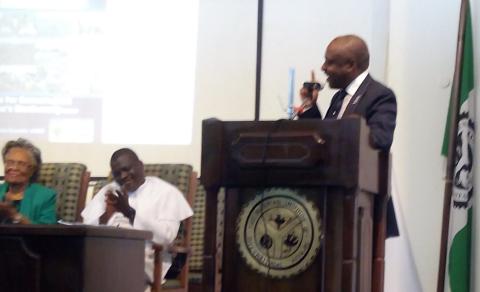
Nigeria needs $520 billion dollars (N7.8 trillion) over the next three decades to clean up areas of the country polluted by crude oil, an expert has estimated.
Hilary Inyang, a professor of Environmental Engineering and Science, gave the estimation in a keynote he delivered at an environmental forum in Lagos to mark the World Environmental Day. The forum, organized by the International Energy Communication Limited (IECL) took place June 3 at the Nigerian Institute of International Affairs on Victoria Island, Lagos.
Mr. Inyang disclosed that Nigeria has three thousand, nine hundred and twenty contaminated sites, adding that it would cost the government “five hundred and twenty billion dollars over the next 30 to 35 years to clean up.” He said it would not be possible to clean up all the contaminated sites in the Niger Delta, adding that certain areas that require urgent attention must be selected. He stated, “the most contaminated sites are not in Ogoni. The most contaminated site is Kebidada in Bayelsa State. There are many in Ogoni, but there are some that are worse and not in Ogoni.”
Responding to a question on how to find funds for clean-up projects, the keynote speaker said there was an ecological fund set aside to cater for such issues, but regretted that some governors had diverted it as security votes. He told the audience that the fund was supposed to address Nigeria’s ecological problems, including oil spillages, desertification, issues on climate change, and waste management. According to him, the fund had in the past grown to 180 billion naira, adding that governments get away with diverting such funds because the civil societies are often too tame to question governments.
Mr. Inyang also drew attention to the ecological and health impact of environmental pollution, noting that some oil spillages direct ecological impact while others have an indirect impact due, often arising from people eating or inhaling contaminated substances.
He called for the development of adequate regulations, environmental management capacity, technical guidance support systems, and data gathering.

Mr. Inyang remarked that environmental pollution was not peculiar to Nigeria, but added that Nigeria lacks the capacity to manage her wastes properly. “Nigeria has environmental challenges that are quite smaller than that of the USA. The United States has over twenty-five thousand chemicals, and any of those poorly managed can be a contaminant. The issue with Nigeria is that, while all those technologically advanced countries have the capacity to address those challenges, the capacity to address them in Nigeria is very small. So, if the challenge is to be scaled by the magnitude of the problem divided by the capacity to address it, the USA comes out advantageous,” he said.
He warned that there would be more spillages in the future unless systems are put in place.
The professor also drew attention to air pollution and radiation, asserting that residents of Benue, Kogi, and Abuja were susceptible to their effects. He said the hydrocarbons found in the Niger Delta were also in Lagos owing to automobile fumes.
He also focused on the crisis of desertification in the north and deforestation in the southern parts of the country.
“Total clean up is an expensive project, and Nigeria cannot afford such project now. So the best approach in Nigeria is preventive rather than remedial,” said Mr. Inyang.
He added that “one of the environmental and health stressors in Nigeria is the leakage from underground petrol tanks. I say this because most of them tend to be located in areas of high population density.” He disclosed that hundreds of thousand oil tanks in Nigeria are punctured and therefore contaminate water. According to the keynote speaker, this was a problem since most of Nigeria’s water supply systems are not networked, with many people resorting to drilling boreholes that become vulnerable to contamination.
Guest of Honor, Grace Anele Williams, a former Vice-Chancellor of the University of Benin, regretted how Nigerian governments had mismanaged the wealth from oil and paid no attention to the maintenance of the environment.
The chairman of the occasion, Diran Fawibe, said in his concluding remarks that Nigeria had been making profit from oil for over six decades, but paid little attention to the environment. “It is sad that it took us so long to realize that we need to pay attention to the environment. Unfortunately, Nigeria does not seem to have the financial capacity to pull this through,” he said.
He also warned that if care is not taken, Lagos might soon join the states suffering from oil spillage with the discovery of oil in Lagos state.